Overview of the innovative Google search platform, its advanced ways of use, and the impact on SEO strategies

Google is about to revolutionize our online search experience with the introduction of Google SGE, acronym for Search Generative Experience, an advanced generative search system which to date (March 2024) is only available in the United States for some queries and for users participating in the beta version.
This innovation, brings significant changes in the way we interact with the search engine and has opened up new perspectives in the area of online information discovery. In this article, we will explore the key features of Google SGE, analyze how it is affecting our search experience, and what are the repercussions for SEO (Search Engine Optimization) of this technological revolution.
Understand what Google SGE is and what its purpose is in brief
Google SGE is an innovative AI-based platform that enables the search engine to more deeply understand the meaning of a query, and to properly capture the context of the query by considering not only individual keywords but also the relationship between them and the overall meaning of the query. This breakthrough is critical to delivering more relevant and contextualized search results, greatly improving response accuracy.
Google SGE, in fact, makes it possible to anticipate users’ intentions, providing answers best suited to their specific needs. This not only simplifies the fruition of information, but also optimizes its timing, and online search becomes increasingly personalized, intuitive and efficient.
How was this great achievement possible? Google already has several hundred zettabytes (a zettabyte is equivalent to a trillion gigabytes) of data that it can use to train models of artificial intelligence, one of them is generative artificial intelligence. Google uses the enormous volume of data at its disposal and inserts them into its sophisticated artificial intelligence algorithms and its large linguistic models (LLM). These models are trained to understand the context behind a user’s query, behavior, and other parameters, and return appropriate results at lightning speed.
Google is using Pathways Language Model 2 (PaLM 2) to enhance its generative artificial intelligence. It is the same model behind Gmail’s “Help Me Write” feature, but further expanded to include deep learning, machine learning and natural language processing. All of these technologies combined give Google’s SGE the ability not only to answer a user’s question, but also to process the context behind it and the connotation, perform natural language processing, and formulate answers based on its understanding.
Google SGE is not just a generative AI for questions and answers. Rather, it offers follow-up suggestions using smartcards that the user can select to refine their searches or converse with the AI.
How AI is used in Google SGE
The introduction of Google Search Generative Experience (SGE) has led to the implementation of three advanced ways of using artificial intelligence (AI) within the search engine. These modes, called AI Snapshot, Conversational Mode and Vertical Experiences, revolutionize the online search experience by offering more contextualized and in-depth answers.
AI Snapshot
This mode is distinguished by its ability to generate concise answers in response to detailed, extended, complex questions, giving users an immediate preview of relevant information.

Source: The Keyword, Google blog
Conversational Mode
Designed to handle searches that develops through follow-up questions, this mode maintains the context of the original search. Allowing a more fluid dialogue with the user, it is able to understand subsequent requests, offering coherent and detailed responses.
You can activate conversational mode by tapping “Ask a follow-up” or one of the suggested next steps below the snapshot.
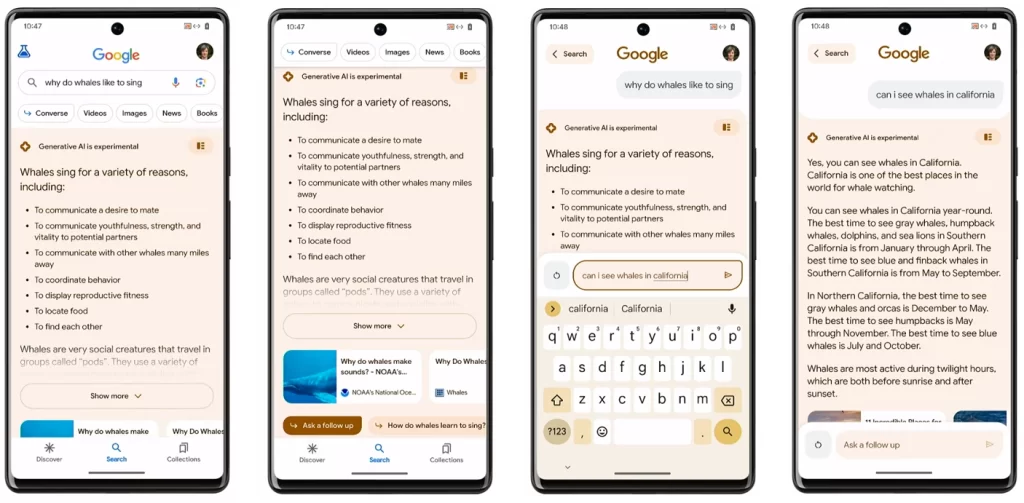
Source: Google I/O 2023
Google SGE’s ability to handle conversational search means that users can interact with the search engine more naturally, asking complex questions or requesting detailed information as if they were conversing with a virtual assistant. This more conversational approach makes online search a more intuitive and personalized experience.
The search engine can learn from users’ preferences over time, delivering results increasingly tailored to their specific interests and needs. This level of personalization not only simplifies search, but also helps create a more engaging and relevant online experience.
Vertical Experiences
In a commercial context, this mode provides preferential lists of product features and details, helping to optimize vertical searches such as shopping.
Its ability to offer a more specific and detailed search experience is particularly useful for users looking for in-depth information on products or services.
In the following sequence of images, we see the example of a navigation path in Google SGE in Vertical Experiences mode:
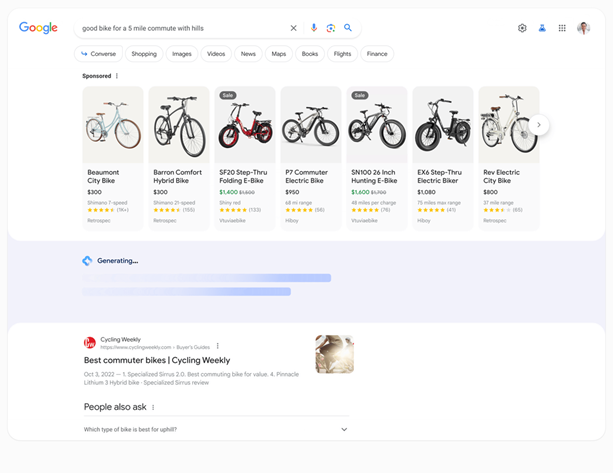
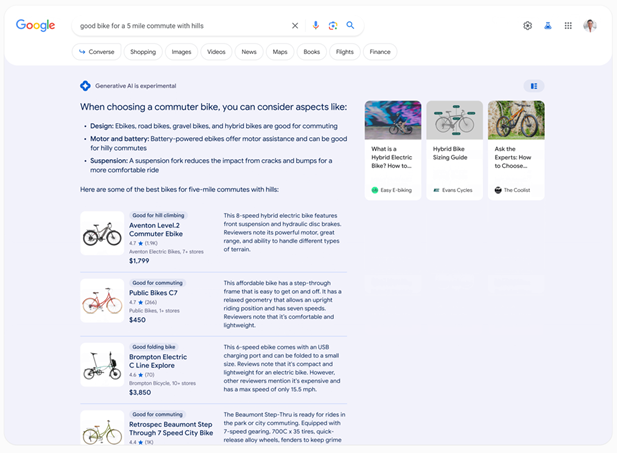
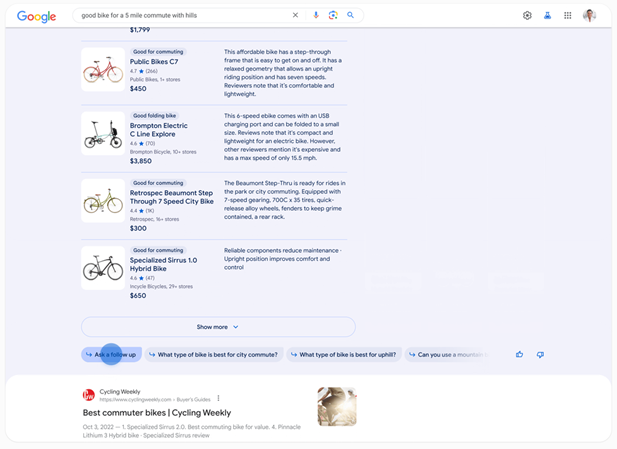
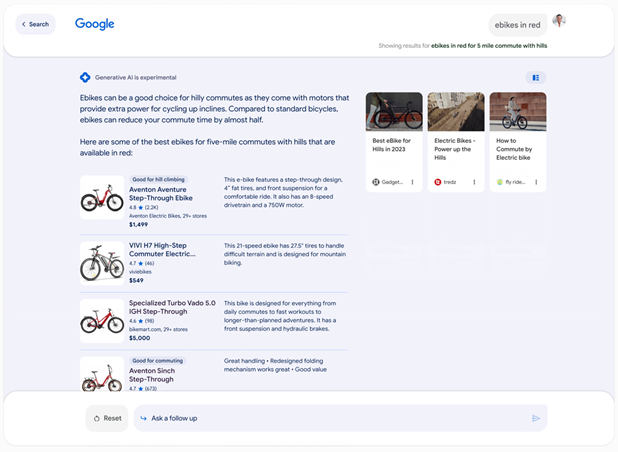
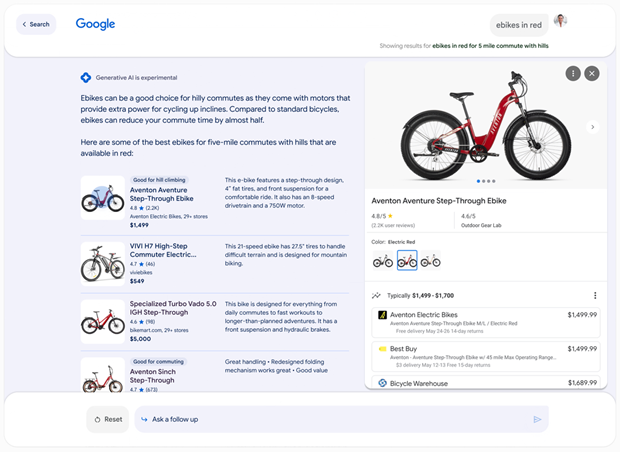
Source: The Keyword, Google blog
How SERPs might be presented by Google SGE
The implementation of Google SGE, will result in a significant improvement in the structure of SERPs (Search Engine Results Pages) in the presentation of search results, and consequently a better user experience. Some of the key features of how SERPs could be presented through Google SGE are described below.
Contextualized results
As mentioned above, Google SGE will introduce more contextualized search results, taking into account the implicit meaning of user queries. The results will be presented based on a deeper understanding of the context, offering more relevant answers to user questions.
Conversational visualization
The presentation of the results will be more suitable for a conversation, as previously explained. Text snippets will therefore reflect a more conversational tone, making users more likely to perceive the results as direct answers to their questions.
Diversification of types of content
In addition to traditional links and text snippets, Google SGE could help present a wider range of content types. This could include visual responses, video fragments or multimedia content relevant to the search context.
Extended customization
SERPs will be highly personalized based on the user’s past search preferences and behavior. Users may see different results for the same query based on their profile and online habits.
Integration of voice results
With the growing popularity of voice search, Google SGE may integrate voice results more highly into SERPs. This means that transcribed excerpts from voice responses or suggestions based on previous voice interactions may be included.
More interactive elements
SERPs could become more interactive, allowing users to explore further details without necessarily having to click on a result. Elements such as image previews or short video excerpts could appear directly in the SERPs. However, it will always be a priority for Google to drive traffic to websites, both on the organic search side and on the paid search side.
Emphasis on truthfulness and reliable sources
Google SGE could place greater emphasis on presenting results from authoritative and reliable sources, helping to mitigate the spread of incorrect or misleading information.
Context exploration
As previously mentioned, users may have the ability to explore the context of a search result in more detail, obtaining additional information or viewing related sources directly from the SERPs.
Impact on Content Creation for SEO copywriters
With the introduction of Google SGE, the biggest challenge will also be for experienced SEO copywriters who will have to take into account the new Google algorithms increasingly designed to go deep into online texts, investigating more and more contexts and semantics.
Here, then, are the crucial aspects that SEO specialists will need to consider in their approach to online search:
- Writing optimized content is no longer just a matter of keywords, as Google SGE’s advanced algorithms can interpret the implicit meaning of a query; This requires a deeper reflection by copywriters and SEO specialists to support this change.
- First of all, you will need to focus on the quality of the content. Google SGE favors informative, well-structured and context-relevant content. Writing articles that offer added value becomes crucial to obtaining greater visibility in search results. And semantic optimization becomes a key element: in addition to individual keywords, it must be considered how the contents fit into a broader context; creating a logical and coherent content structure, with clear semantic connections, becomes an effective way to satisfy Google SGE algorithms.
- Understanding search intentions is another crucial aspect. You need to try to understand what users are really looking for and provide comprehensive answers to common questions. This not only improves visibility in search engines, but also increases the authority of the content and the resulting trust.
- Using multimedia formats such as images, videos and graphics can further enrich your content. Google SGE is able to interpret and enhance visual content, helping to improve the completeness and overall relevance of the published material.
- Finally, adapting to the new dynamics of conversational search is critical. SEO copywriting must consider how people formulate questions during a conversation and try to integrate those elements into their content. This not only improves visibility in voice searches but also aligns with the growing trend toward more natural interactions with search engines.
Ethical Considerations and Privacy Issue
The implementation of advanced technologies such as Google SGE inevitably raises ethical questions about privacy, and the protection of copyright and proprietary data. We will now examine concerns related to data collection and processing, as well as list some measures that Google might hopefully take to be compliant in this regard and to ensure responsible and safe use of its new technology.
A major concern is the amount and type of data collected when using Google SGE. The complexity of generative search algorithms may require a wide range of proprietary information to provide highly personalized results. This raises questions about respecting user privacy, protecting copyright and proprietary data, and the transparent management of such data.
In addition, transparency in data processing is essential to ensure user trust. Users need to be fully aware of how data is used, what information is collected, and how it is processed to improve the search experience. Google could hopefully adopt clear and accessible communication practices to inform users about how data is handled.
Data security is another critical concern. With the increasing complexity of technologies such as Google SGE, it is essential that robust security measures are implemented to protect personal and proprietary data from unauthorized access or potential privacy and copyright violations. In fact, users need to feel safe in providing personal information while using such services, without fearing risks to their own security.
Google could hopefully adopt strict privacy policies and comply with current data protection regulations. Ensuring adequate levels of data anonymization and aggregation, limiting access to personal information only when strictly necessary to improve the search experience, would be desirable.
In regard to protection of copyright and proprietary data, the collection and processing of data by Google could then hopefully guarantee the conveyance of users to the websites that own such data. The presentation of such data in a merely conversational way with the user without having him land on the proprietary website would raise some ethical doubts.
It is encouraging to note that Google has often demonstrated a commitment to privacy and data security, as well as a willingness to drive as much traffic to websites as possible.
The ethical and privacy issues associated with Google SGE require a thoughtful and responsible approach. Efforts to balance technological innovation with respect for privacy and data are essential to ensure that users can benefit from new search capabilities without compromising the security and confidentiality of personal and proprietary data, and without compromising the inviolability of copyright.